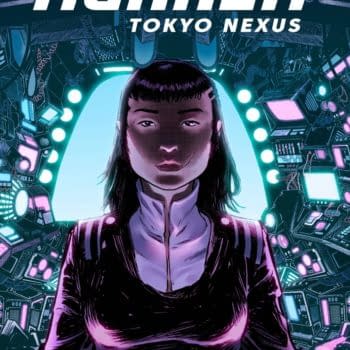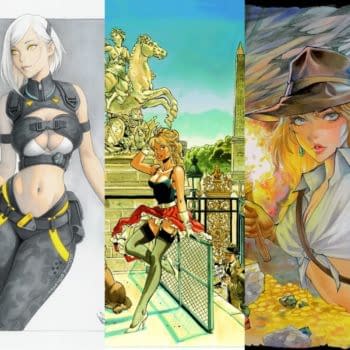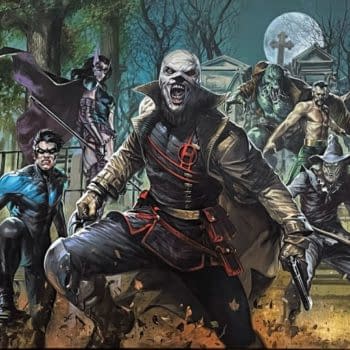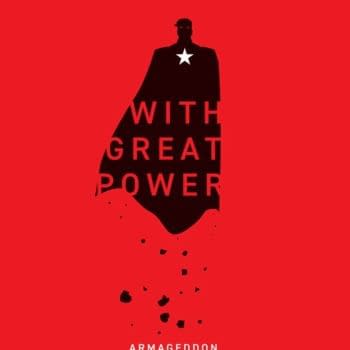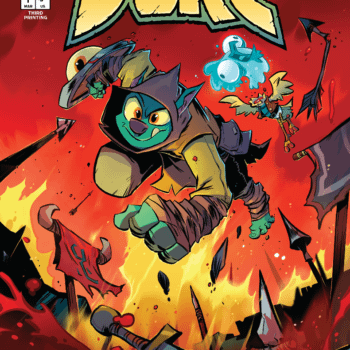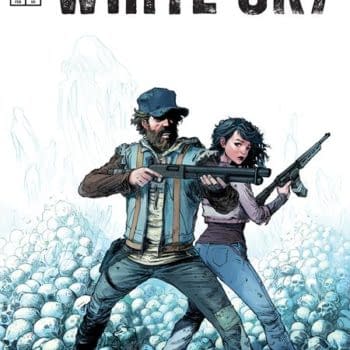Posted in: Comics, Recent Updates | Tagged: Comics, eric stephenson, image, interview, q&a
Bleeding I – Q&A With Image Publisher Eric Stephenson

Rich: A number of people criticised me for being terribly harsh on you last time, for being an Image hater, for being one-sided, for being unprofessional in my questioning. Did you feel the same – and if so why are you back for more?
Eric: I didn't think the questions were particularly harsh. A little blunt in places, and I think I called you on the one instance where I felt the question was based on flat out inaccurate information, but you know, I'm not a big fan of bullshit or beating around the bush. You asked honest, straightforward questions and I gave you honest, straightforward answers. There were a couple questions that seemed a bit specific to your own experience, but given that you and I have known each for years and have some professional history together, I suppose it would be difficult to avoid that side of things altogether. I also think it would have been a boring interview if you'd just asked me the same run of the mill questions that tend to get asked in that type of interview, and ultimately, I appreciated the opportunity to address some of the concerns you raised.
Rich: Last time we talked about Image's back end and page rate models of publishing. Bleeding Cool reader Emperor asked if a half-way house between page rates and back ends could be an advance against royalties, popular in the book publishing industry, so creators don't have to seek Work For Hire gigs while working on Image books, helping to increase the very things like a regular schedule that makes books a success, without giving up the media rights that make Image popular. Is this a model Image has considered?
Eric: That's definitely something we've considered and something we'd be willing to negotiate, but as I've said before, we'd have to get something in return, whether that be an increased percentage on trade sales or some participation in media rights. It makes zero sense for Image to simply throw money at something we may never see a return on. Nobody does that, and I'm not sure why anyone would expect it of Image.
The media rights thing… I think there's a big difference in exchanging a percentage of media rights in return for some upfront money, as opposed to a situation where the standard deal at other publishers it to take half or more. Marvel and DC obviously have these towering corporations behind them — Disney and Warner Bros. — and even IDW is owned by a larger corporation. To varying degrees, they can shovel as much money as they want into various properties and wait years for that stuff to pay off. That's not our model, though, and so unless there's a situation when someone comes to us with a project that is 100% guaranteed to sell, right out of the gate, then we have to come up with some way to make an advance work for both parties. I don't think that's unreasonable.
Rich: Bleeding Cool reader Alhelm criticised me for not taking you to task for "at least a few of the terrible, terrible Extreme Studios titles he used to write." Now, I quite liked New Men, I recall. But I remember thinking Brigade and Team Youngblood were atrocious comics. It seemed to me they were drawn by sub-Liefeld wannabees who copied all of Liefeld's flaws but never managed to capture that kinetic surface magic that made his work appealing. And rather than imposing any kind of writing structure, they seemed little more than random pages held together by string. What's your memory of that time, the work, and how you react to it now? Was there something I missed?
Eric: Well, honestly, I don't think there's anyone more critical of that work than me, but for all its faults, I'm not sure I agree with the standard line that everyone working at Extreme was a Rob clone or that everything was awful. I mean, I'll be frank: I think some of the worst work we put out was by more established writers and artists, and if you want to talk about artist wannabes, I think the worst offenders were imitating artists other than Rob. Meanwhile, there was some great young talent at Extreme. Jeff Matsuda, Todd Nauck, Danny Miki, Jonathan Sibal, Norm Rapmund and the Liquid! guys, Chris Lichtner and Aron Lusen, all did early work at Extreme. I put an emphasis on "early," too. Everyone there was a kid, from Rob on down, and I think that showed in the work. I'm proud that we found those guys and helped them establish themselves in the business, though. They were great people to work with, and I think the work they've gone on to do in the years since speaks well of the decision to bring them on board way back when.
I honestly have a lot of admiration for what Rob was trying to do at that time, because he basically wanted to share his success with other young creative people. Rob was very idealistic in that respect. He wanted to usher other artists into the business under his wing in a way that really wasn't being done at that point. It worked out better in some instances than it did in others, and I don't mean that as an understatement. Some of what we did was better than people gave us credit for; some of it was just plain awful. There were instances I was presented with work to script that was so frustrating to work with… Just not much coherence in the artwork, no experience with actual storytelling, no regard for the plot… But I was young and I made a go of it. I was scripting something like five or six books a month at one point and just wasn't old or experienced enough to realize that it maybe wasn't the wisest thing in the world to do all my growing up in public. Sometimes things held together okay; other times I was incredibly embarrassed by what came out. I eventually realized I just needed to take more time on what I was doing and exercise a bit more control over work with my name on it, and some of the later Youngblood and New Men stuff came out of that.
I can't speak to everyone else's experiences, but I know that period in my career was very much about kind of figuring out how everything worked. It was real trial by fire type of stuff and there were bad days alongside the good, but you know, I think I'm better for the experience. There are any number of former Extreme staffers who like to go online and bitch about how hard done by they were, but my recollection is that we were all paid extremely well to figure out what we were doing on the fly. I was working in a library before that, driving the bloody bookmobile. I think I traded up, and I think everything worked out all right in the end.
All that said, I think Rob doesn't gets the credit he deserves for the vast library of characters he created. Whether the comics they featured in were good or bad is only part of the story; Rob had a lot of great ideas and it was exciting to be involved with them. I still think those characters have value, and hopefully, there will eventually be an opportunity for someone to reintroduce them to readers and make good on their potential.
Rich: A few people were surprised to know you were my editor back in the days of comics website Next Planet Over, on the four episodes of The Gutter Press that made it to broadcast. Do you have any memories, pleasant or unpleasant, of that period?
Eric: Other than making a couple long-lasting friends and meeting one of my ex-girlfriends there, I can't say I have too many pleasant memories of that experience. That was during the Dot Com boom, when people were under the impression there was some kind of venture capital god shitting money all over the place, and it didn't take long to realize how absolutely doomed that whole operation was from the get-go. I mean, we ran your column for a few weeks and then they said they weren't happy with the traffic, when what they really meant was that people were reading the column, but weren't necessarily buying anything as a result. I was in charge of the content on that site and I did what I could to make things more interesting than whomever held the position before me, but at the end of the day, all they cared about was sales and if the content didn't translate to sales, they didn't want to know. There were free lunches, all kinds of soda pop and snacks and we had some very lush offices in Santa Monica, but at the end of the day… Yeah, just a mind-numbing, miserable experience.
Rich: There's been a lot of industry chatter about the change in price point of late, with DC moving to a $2.99 20 page model, and Marvel selecting a few more random titles for the change. As a publisher, what's your take on the price point debate and how does Image advise its creators over the matter?
Eric: Our currently policy is that $2.99 is our standard price point, and we encourage creators to keep their pricing in that range. I wish I could say all our books are $2.99, but ultimately, that's a decision that is made with our creators, and for some of them, they either price the books higher or they can't do the books. The difference there, though, between these individual creators and the publishers who charge more, is these guys don't have paid advertising or financial backing from a larger corporation. They're making it on their own and just trying to put out something they believe in. That translates into Image doing books priced at $2.99, $3.50 and $3.99, all the while doing original material with fewer ads.
It's kind of a weird situation, because historically, indie books have always been about a dollar more than Marvel and DC books. I mean, you look at IDW and their books are $3.99, and based on the way things were done in the past, that's exactly where they should be in relation to Marvel and DC. Now DC is scaling back prices to $2.99, but they're cutting their page counts. Marvel is doing… something. They're making announcements about doing something, anyway. It's my understanding there actually isn't going to be much of a change. But you know, hey, they got some attention with the announcement, right? It's all pretty disingenuous.
We're not out there claiming that we're doing everyone some huge favor by knocking the price down on a couple books. Our prices are what they are, out of either fairness or necessity. I think most of us agree that holding the line at $2.99 as long as possible is in everyone's best interest.
Image has published three of my stories to date. They may publish more. Live with it. Send your questions to richjohnston@gmail.com or add them in the comments section






